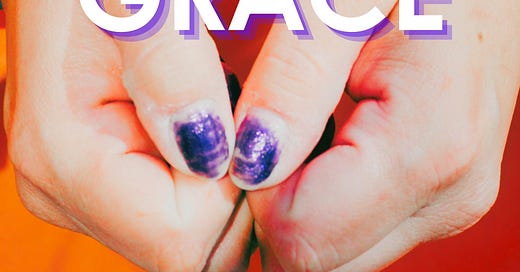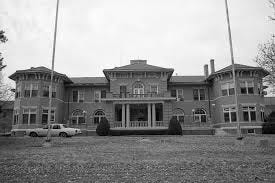Stoic hopelessness and small cruelties
A review of Barbara Shoup’s About Grace from Querencia Press
This is my second installment in my 2025 series where I read and review one book from a small press every month. Check out the first review of
’s Dear Edna Sloane from here.I’m not saying it makes a lot of sense, but sometimes when things get bad in a particularly aberrant way (as they have in the last month), I comfort myself with the more “normal” and perpetual miseries of the world.
I think about the fact that what Elon Musk is or isn’t doing with our social security numbers doesn’t matter much to the homeless people on the streets of my town. Or I remember that who is president makes not one bit of difference to the millions of animals living out their miserable lives in confined animal feeding operations every day. Yes, eggs are super expensive, but even before avian flu, it was true that 14 million children in the U.S. live in homes that are food insecure.
There are so many cruelties that we mostly accept as part of our day to day existence, often untouched by the tsunami winds that are national politics. It doesn’t make the new cruelties any easier to bare. And it’s not a competition. It’s just a reminder that the world is always a little fucked, in ways big and small. And the world is also amazing, even if we have to marshal all our concentration in order to see that brightness amidst the dark.
I was reminded of both those small cruelties and the light in the darkness this weekend when I read
’s new young adult novel, About Grace, which is now available for pre-order ahead of its March 1st pub date from Querencia Press.The novel takes us into the Wabash Valley Juvenile Correctional Facility, where Grace, a young, middle-class woman from a “good” family, has somehow found herself after getting caught breaking into a house with her trouble-making boyfriend, Kyle. While Kyle’s rich and connected parents get him sent to a boarding school, Grace’s parents choose not to intervene, which lands Grace in prison.
The novel is inspired by Shoup’s time spent teaching a writing workshop in the juvenile correctional facility in Indianapolis. She says in the acknowledgments that she was struck by the “stoic hopelessness” of the young women imprisoned there.
Stoic hopelessness is a hard expression to hear applied to women as young as fifteen. In a novel like this, we yearn for more than hopelessness. Certainly with Grace and her middle class background, there’s a possibility that she might turn her life around. But for the other young women she shares Cottage 5 with, it’s hard to imagine anything but stoic hopelessness.
Most of the young women are in the prison for what sociologists call crimes of poverty. They’re addicted to drugs (mostly meth), but no one in their lives can afford treatment for addiction. They’re victims of various kinds of abuse, but there are no resources available for them to safely escape that abuse, let alone get the counseling they might need to deal with the lingering trauma. One of the young women, Electra, has a calculated plan to stay in the prison until she’s 18 in order to avoid being put back into the foster care system. For her, prison is preferable to another foster family.
The prison itself focuses on “rehabilitation,” embracing that uniquely American ethos of, “only you can save yourself,” while ignoring the barriers of poverty, sexism, abuse, and racism that these young women have to contend with inside and outside of the prison. The young women are not taken in by the hypocrisy of this message. The prison encourages them to say no to drugs while forcing every single inmate to take a prescription sleeping pill each night. So, say no to certain types of drugs.
One of the blurbs for About Grace described it as the young adult version of Orange is the New Black and if you liked Orange is the New Black, you should absolutely read About Grace. But you should also read it if you liked One Flew Over the Cuckoo’s Nest, which I think it has more in common with (really, regardless of what you do or don’t like, you should read About Grace).
Like One Flew Over the Cuckoo’s Nest, Shoup’s novel highlights the pettiness and small cruelties of institutional life. In so many settings, the young women are prohibited from talking to each other. They’re not allowed to touch each other, not even to hug a fellow inmate who’s clearly suffering when she finds out she’s lost custody of her child. There’s no cursing. I mean, are you fucking kidding me? If I can’t curse when I’m in prison, when the fuck can I curse?
In the system of demerits and points that dictate how soon the young women will be released, they get points for attending a Christian fellowship service, which should be illegal, given that the prison is a government institution. Grace, who is a victim of abuse herself, is lucky enough to know that if she tells the prison counselor about the abuse, that counselor is legally obligated to tell Children’s Services, who are legally obligated to tell her parents. Grace doesn’t want her parents knowing about the abuse, so she can’t talk to her counselor about what is probably the largest underlying issue she faces.
How is this a good system? How do we live in a world where we believe these small cruelties are somehow justified? How is this a system that puts the lives and health of these young women first? It isn’t.
The scene that most brings these small cruelties to poignant life is one where the young women are having a contest to see which cottage can bag the most leaves. “It’s a tradition…,” the passage reads. “Every Halloween, the yard crew blows the leaves into huge piles and the girls…” How would you finish that sentence? With all the privileges I’ve walked through the world with, the sentence finishes with the girls jumping into those huge piles of leaves. That’s the tradition, right?
But, no, the tradition is the contest to bag the most leaves. The tradition is unpaid labor. And, yes, the cottage that wins gets a pizza party, with real pizza. But can you imagine being a teenager, raking leaves and not being allowed to jump into that pile? That small pleasure isn’t for you. Pleasure in general is not for you. When one girl does jump into a pile of leaves, she gets put in solitary, which is probably one of the cruelest things you can do to any human.
The sociologist Erving Goffman called what happens in total institutions like prisons and insane asylums mortification of the self. It is cruel, of course, to deprive a person of their freedom. But that’s not enough. In prisons, we deprive people of the ability to manage the way the world sees them. We deprive them of the ability to engage in impression management, the subtle ways we control information in order to present ourselves in a favorable light.
We take away not just their freedom, but their basic human dignity. We communicate to young women like those in the novel over and over again that they are not worthy of being treated like a human being and then we expect them to forget that lesson when they’re released into the wider world. We meet the trauma that has brought them to this place with yet more trauma. It is a system that makes absolutely no sense and About Grace shows us this in the subtlest and quietest of ways.
The novel does this by refusing the simplicity of a certain sort of troubled youth narrative. In this narrative, some understanding adult steps into the picture to rescue said troubled youth. There are understanding adults in the novel, including the counselor. But part of what those adults understand is that there’s only so much help they can give. The young women get more support from their relationships with each other. In this most dehumanizing of situations, they still find ways to care for each other. Those are the moments of brightness in the dark.
But that stoic hopelessness of the young woman in this system is not misguided. They need more help than one understanding adult could every possibly provide. They need a whole new world. They need a movement to abolish prisons. They need a fucking revolution, which is what all of us need right about now.
You can pre-order About Grace here and check out
’s newsletter, .Extra stuff
- Before being moved to Indianapolis, the girl’s juvenile correctional facility was located in Madison, on the grounds of the old state mental hospital. This is where Shoup imagines the girls in the novel. It is, as the young women describe, a weird and creepy place to be imprisoned. At the same time, it overlooks the Ohio River valley and it breaks my heart to think of those young women just yards away from that beauty and not able to enjoy it.
- A former student and sociology major, Jacie Minnick, worked at the prison when it was still in Madison and was featured in a Netflix documentary series about the prison, Girls Incarcerated. Jacie is still working in juvenile justice, now for the Girls Empowerment Network. Like so many organizations, their good work is threatened by this Republican administration, if you’re able to, I’m sure a donation would be appreciated.
- If you want to read more about prison abolition:
An Abolitionist’s Handbook, by Patrisse Cullors
The New Jim Crow: Mass Incarceration in the Age of Color-Blindness, by Michelle Alexander
“Prisons Make Us Safer”: And 20 Other Myths about Mass Incarceration, by Victoria Law
The End of Policing, by Alex S. Vitale
Also, I’m making a weekly list of small things we can do and here’s the one for this week.






Thanks for review. Don't think I can make it through it now myself. And thank you for the what we can do suggestions!!